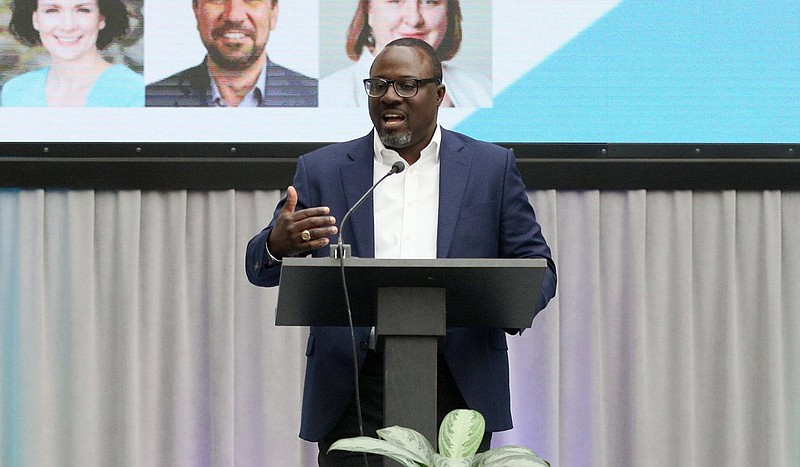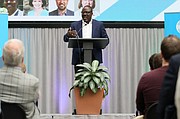Imagine a machine that dispenses medications much like a Redbox dispenses DVDs at Walgreens, or having the ability to text and send a picture to a doctor directly to get an expert opinion on a possible allergic reaction instead of entrusting a Google search.
Both are possibilities that are becoming a reality for more patients thanks to the first health care accelerator program in Chattanooga that brought together eight companies in the Chattanooga area and from across the country to pitch innovative solutions to some of the industry's biggest problems today.
And providing convenience in health care was the big theme of the Company Lab's first HealthTech Accelerator Demo Day at Unum on Wednesday, where seven of the eight companies pitched their ideas in an attempt to market their product and attract potential investors.
In nine weeks, the eight companies had more than 100 meetings with industry leaders combined and more than 50 pitches to investors that yielded $20 million in additional funding.
"Convenience has to be a requirement in health care just like it is in everything else that we do in life," said Kathy Ford, president and chief product officer at Rhinogram.
From Uber to Amazon Prime, people expect convenience in every other aspect of their lives, so why shouldn't they expect it from their clinicians, Ford explained.
Rhinogram, a Chattanooga- based company, enables patients to reach their physician's practice through text messaging that does not require a mobile app or portal to download. Four out of five patients prefer texting their providers over speaking on the phone, Rhinogram reports.
Rhinogram already has 200 customers in 400 locations and 44 states. With Telehealth being one of the fastest-growing sectors of the industry, Ford said Rhinogram is on track to bring in over $500 million in revenue by 2025.
The company is currently looking for a $5 million investment to help create more features and add additional sales staff and support personnel, she said.
Another big theme of the day was companies hoping their product can reduce unnecessary health care costs, like Atlanta-based PreTel, which has developed wearable biosensors for pregnant patients to help reduce the $38 billion annual costs associated with ineffective labor management. That equates to about 4 million births, said CEO Marc Finch.
A white machine the size of a coffee pot named "Spencer" might be the solution to medication mismanagement, according to Ken Lowden, founder and CEO of Ooltewah-based MedX Services.
The "cloud-based, at-home medication tool" dispenses the right medication for a patient at the right time. Medication errors are the cause of over 75% of all hospital readmissions and the current national medication adherence rate is just 54%, Lowden said.
The local company is now looking for customers in East Tennessee and North Georgia as well as connections to health systems, insurance companies and angel funding, Lowden said Wednesday.
Erlanger Health Systems, Unum and CO.LAB jointly sponsored the 10-week accelerator program, and employees from both Erlanger and Unum served as mentors, offering their industry expertise, insight and connections. Unum is the world's biggest disability insurance company and Erlanger is the nation's 10th-largest public health care system.
Bruce Komiske, vice president of new hospital design and construction at Erlanger, was a mentor who worked with Finch and PreTel.
"We are building a new women and children's hospital, and to see a company come up with a concept that has such potential and significance was extremely exciting," he said. "And to see our clinical staff resonate with the idea and work with [Finch] and his team and hopefully bring it further along and bring it to life was really exciting."
Erika Grau, Rhinogram's director of marketing, said the company's representatives specifically enjoyed getting feedback from "like-minded people."
"All of these people are in the same mindset of wanting to better health care," she said. "We ultimately have different products but have the same mission to make health care better."
Contact staff writer Allison Shirk Collins at ashirk@timesfreepress.com, @AllisonSCollins or 423-757-6651.
Featured technology
Here are the eight companies that participated in the program and their products/solutions:› Canopy Innovations is an e-learning language platform from New York City designed to help hospitals and community clinics eliminate the language barrier in health care by 2030.› Healing Innovations is a medical device company in Nashville that created the Rise&Walk, a patented gait training device that provides efficient and affordable walking therapy to paralyzed or physically impaired patients.› KelCor is a local medical device start-up developing simple, efficient, and cost-effective product solutions to improve infection control and patient care.› Medical Search Technologies is a Chicago software company creating searchable data from unstructured text, such as radiology reports and patient progress notes, to manage compliance and identify care pathways for complex medical conditions.› MedX Services is an Ooltewah medicine management company that is dedicated to improving medication adherence and reducing the costs associated with non-adherence.› Pretel is a local company developing wearable biosensors, proprietary regional uterine physiologic signal detection software, and personalized labor progress status algorithms to reduce preterm birth and the costly poor outcomes of induction delivery.› Rhinogram is a telehealth solution business in Chattanooga that removes patient-provider communication barriers via texting and increases provider efficiency by reducing staffing costs, enabling reimbursable virtual consults, and leading to new patient acquisition.› VendRx Inc., which was started in South Jordan, Utah, is an automated prescription dispensing system designed to be located at the point of convenience so as to increase patient adherence and reduce health care costs.

